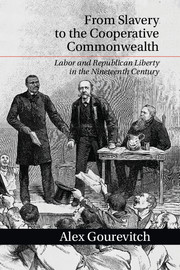Book contents
4 - Labor Republicanism and the Cooperative Commonwealth
Published online by Cambridge University Press: 05 December 2014
Summary
There is an inevitable and irresistible conflict
between the wage-system of labor
and the republican system of government
George McNeill
On January 9, 1865, an iron-molder named William H. Sylvis traveled to Chicago to address the national convention of the Iron-Molders’ International Union (IMIU). Sylvis, then president of the IMIU, gave a two-hour address to what was later described as the “largest Convention of Workingmen of one craft ever held on this continent.” The climactic end of the Civil War was still months away, and the House of Representatives had not yet ratified the Thirteenth Amendment to the U.S. Constitution, which abolished slavery and “involuntary servitude.” Yet, according to Sylvis, history was already in the process of jumping over its own shadow. Even as a momentous “political revolution ... has left its trail of blood upon the sky.... The year ... has witnessed a social revolution such as the world has never known.” Sylvis described this “social revolution” as a “collision between classes,” which had its origins in the industrial relationships of the North, not the slave labor of the South. These new “relations are, for the most part, that of master and slave, and are totally at variance with the spirit of the institutions of a free people, and the relations that should exist between equals.” In Sylvis’s mind, the Civil War was “merely” a political revolution because no government could legitimately call itself republican while permitting chattel slavery. But the concomitant social revolution meant that this external opposition between republican government and chattel slavery had now become an internal conflict between political form and social content. “What would it profit us as a nation,” Sylvis asked, were
all the forms of our republican institutions to remain on the statute-books ... with the wealth of the nation concentrated in the hands of the few, and the toiling many reduced to squalid poverty and utter dependence on the lords of the land.... Again, allow me to ask, what would it profit us if the forms of our institutions were preserved and all else lost.
With this defense of the “toiling many” against “utter dependence” the republican critique of wage-labor reared its head once more.
- Type
- Chapter
- Information
- From Slavery to the Cooperative CommonwealthLabor and Republican Liberty in the Nineteenth Century, pp. 97 - 137Publisher: Cambridge University PressPrint publication year: 2014

